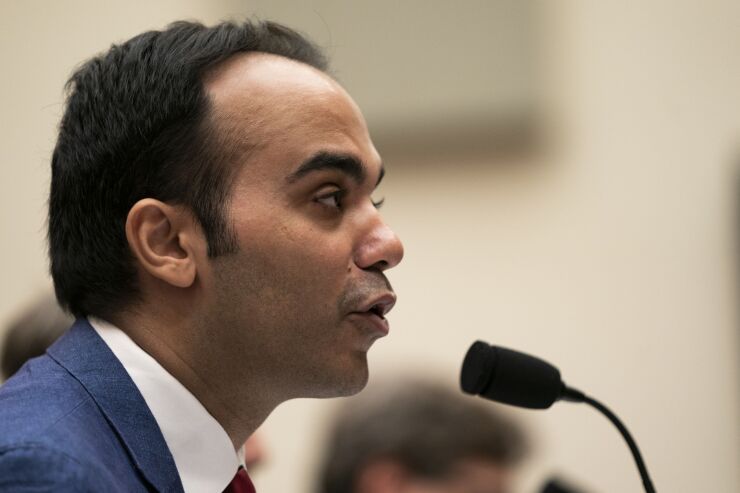WASHINGTON — In a series of blistering back-and-forths with Republican lawmakers, Consumer Financial Protection Bureau Director Rohit Chopra defended a series of guidance documents and other public materials released by the agency.
Republicans repeatedly categorized press releases, public guidance and other content on the CFPB's website as de facto rulemakings, leading to multiple heated exchanges with Chopra. The accusations echo previous complaints about former CFPB Director Richard Cordray, who Republicans said attempted to regulate by unofficial channels rather than going through the public notice-and-comment periods.
The tone of the hearing — the last one scheduled with Rep. Maxine Waters, D-Calif., as chair — previews Republicans' political aims in the next Congress, when they will have the gavel of the committee. Rep. Patrick McHenry, R-N.C., the committee's chairman-elect, said that the House Financial Services Committee will pursue "aggressive oversight to rein in the unaccountable CFPB."

"The political pendulum doesn't stop swinging. Next month there will be a new majority in the House of Representatives," McHenry told Chopra. "I think you'll wish you tried harder to play by the rules."
Before the hearing, Republicans on the committee sent a
One of the most tense exchanges happened between Chopra and Rep. Andy Barr, R-Ky., who took aim at the CFPB's controversial move to adopt a policy that, for the first time, claimed discrimination on the basis of age, race or sex — regardless of intent — violates the federal prohibition on "unfair, deceptive or abusive acts or practices," or UDAAP.
Republicans and trade groups have said the power was
"You're changing the law, you're changing the law without Congress," Barr said.
"That's not true, sir," Chopra responded.

Other Republican concerns centered around how often Chopra met with industry players. Rep. Blaine Luetekemeyer, R-Mo., said that he hasn't met with enough small institutions, and that his meeting schedule was vague.
"We're going to request with you an entire year of meeting descriptions, because they are not here," Luetekmeyer said.
Chopra said that he's done "more industry outreach with those affected by the CFPB than both of my predecessors."
Rep. Roger Williams, R-Texas, raised concerns about the small-business lending data collection rulemaking, saying that small businesses are "terrified" of the reporting requirements. Chopra said that he will take those concerns into account, but that the agency is under a court order to complete the rulemaking by March.
Among other priorities, Chopra said that the bureau would look at how to improve exchange rate transparency among remittance providers.
"When someone is sending a remittance, the cost to them is a mix of any immediate fee plus any exchange rate delta, and in many cases, the consumer cannot really know how much money is going to end up on the other side," he said.





